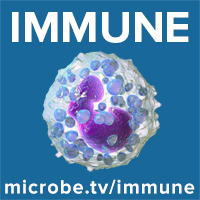Immune reminisces about a year in COVID-19 immunology, Steph’s receiving the Pfizer vaccine, and answers to listener questions about a challenge study with common cold CoVs, T cell exhaustion, how CD4 T cells control infections, and more.
Immune describes the striking loss of germinal centers in lymph nodes and spleen in patients with severe COVID-19, providing an explanation for short-lived humoral immunity and limited somatic hypermutation of antibodies to SARS-CoV-2.
Immune explains a study of 125 COVID-19 patients by deep immune profiling, which revealed three immunotypes associated with poor clinical prognosis or recovery.
Immune continues a discussion of the immune response to infection with SARS-CoV-2, including inflammatory responses and disease, antibody and T-cell responses, and vaccines, and answers to listener questions.
Immune continues a discussion of the immune response to infection with SARS-CoV-2, including vaccines and immunity, effects of BCG and OPV, immunity passports, and answers to listener questions.
Brianne Barker returns to continue a discussion of the immune response to infection with SARS-CoV-2, including use of steroid, coagulation in some patients, cytokine storm, and vaccines.
Immune reveals an alternative to a protective vaccine, engineered B cells that produce antiviral antibodies.
The Immune team discusses immunization of pregnant mice to protect offspring from neonatal herpes simplex virus disease.
The Immune hosts explain how antibody molecules mature, then discuss the finding in infants of potent neutralizing antibodies against respiratory syncytial virus without somatic hypermutation.

